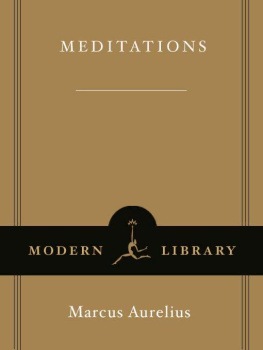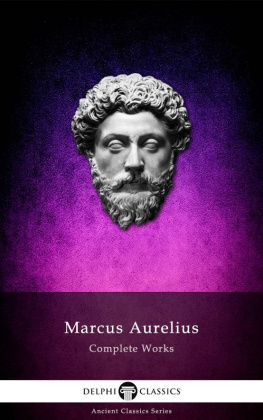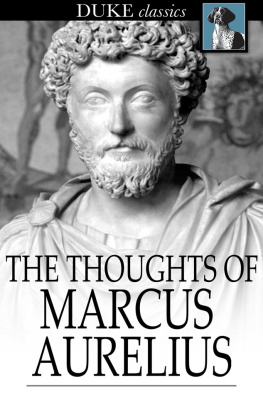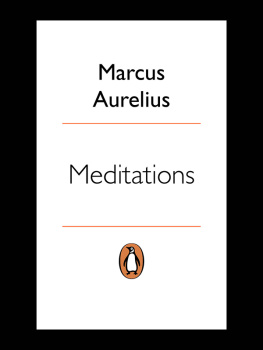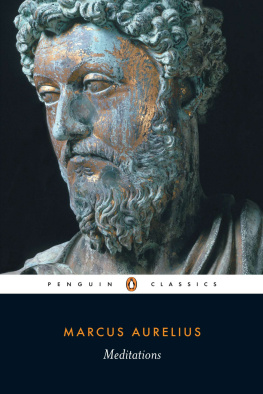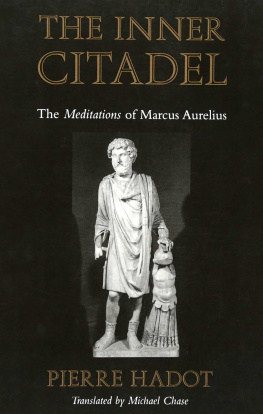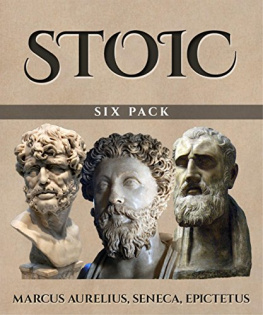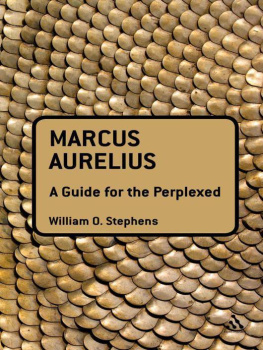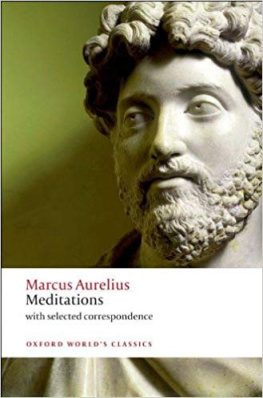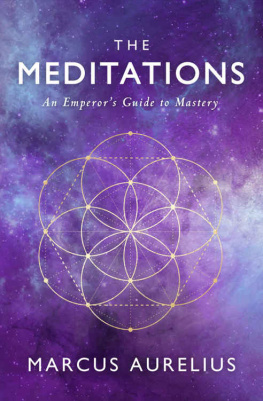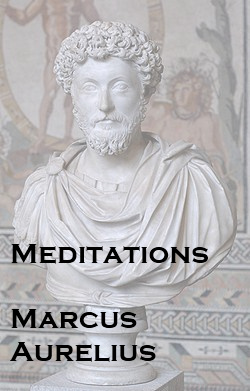
Marcus Aurelius
Meditations
A New Translation, with an Introduction, by Gregory Hays
THE MODERN LIBRARY
NEW YORK
Contents
Meditations
Introduction
Gregory Hays
Marcus Aurelius Antoninus
States will never be happy until rulers become philosophers or philosophers become rulers.
PLATO, The Republic
Marcus Aurelius is said to have been fond of quoting Platos dictum, and those who have written about him have rarely been able to resist applying it to Marcus himself. And indeed, if we seek Platos philosopher-king in the flesh we could hardly do better than Marcus, the ruler of the Roman Empire for almost two decades and author of the immortal Meditations. Yet the title is one that Marcus himself would surely have rejected. He never thought of himself as a philosopher. He would have claimed to be, at best, a diligent student and a very imperfect practitioner of a philosophy developed by others. As for the imperial throne, that came almost by accident. When Marcus Annius Verus was born, in A.D. 121, bystanders might have predicted a distinguished career in the Senate or the imperial administration. They could hardly have guessed that he was destined for the imperial purple, or seen in their minds eye the lonely bronze horseman whose upraised hand greets us from the Capitoline hill in Rome across two thousand years.
Marcus sprang from a distinguished enough family. The year of his birth coincided with his grandfathers second tenure of the consulship, in theory Romes highest office, though now of largely ceremonial importance. And it was to be his grandfather who brought him up, for his father died when he was very young. Marcus makes reference in the Meditations to his fathers character as he remembered it or heard of it from others, but his knowledge must have been more from stories than from actual memories. Of the remainder of his childhood and his early adolescence we know little more than can be gleaned from the Meditations. The biography of him in the so-called Historia Augusta (a curious and unreliable work of the late fourth century probably based on a lost series of lives by the third-century biographer Marius Maximus) tells us that he was a serious child, but also that he loved boxing, wrestling, running and falconry, that he was a good ballplayer and that he loved to hunt. None of these are surprising occupations in an upper-class youth.
Book 1 of the Meditations offers glimpses of Marcuss schooling, and we can fill out the picture by what is known of upper-class education generally at this period. His first instructors, like the unnamed teacher mentioned in Meditations 1.5, were probably slaves, from whom he would have mastered the rudiments of reading and writing. At a later stage he would have been handed over to private tutors to be introduced to literature, especially, no doubt, Vergils great epic, the Aeneid. But literature served only as a preparation for the real goal. This was rhetoric, the key to an active political career under the empire, as it had been under the Republic. Under the supervision of a trained rhetor, Marcus would have begun with short exercises before progressing to full-scale practice declamations in which he would have been asked to defend one side or another in imaginary law cases, or to advise a prominent historical figure at a turning point in his career. (Should Caesar cross the Rubicon? Should Alexander turn back at the Indus? Why or why not?)
Such training was conducted in Greek as well as Latin. Since at least the beginning of the first century B.C. the Roman upper classes had been essentially bilingual, and Marcuss spoken and written Greek would have been as fluent as the French of a nineteenth-century Russian aristocrat or the Chinese of a Heian Japanese courtier. Marcus would have read Homers Iliad and Odyssey and the tragedies of Euripides side by side with the Aeneid, and studied the speeches of the great Athenian orator Demosthenes as intensively as those of the Roman statesman Cicero. It was Greek writers and artists who constituted the intellectual elite at the capital; when in later life the emperor conversed with his court physician, Galen, he would have done so in the latters native tongue. Above all, Greek remained overwhelmingly the language of philosophy. In the late Republic and early empire, writers like Lucretius, Cicero and Seneca had worked to create a philosophical literature in Latin, with notable success. But the great thinkersPlato, Aristotle, Theophrastus, Zeno, Chrysippus, Epicurus, etc.had all been Greeks. Serious philosophical investigation required a familiarity with the language they wrote in and the terminology they developed. That Marcus composed his own Meditations in Greek is natural enough.
In 137, when Marcus was sixteen, a crucial event took place. The reigning emperor, Hadrian, was childless. An illness had brought him near to death a year previously, and it was clear that he would not live forever. Hadrian owed his throne to his adoption by his predecessor and distant relative, Trajan. Following Trajans example, Hadrian had designated the distinguished aristocrat Lucius Ceionius Commodus to succeed him. In 137, however, Ceionius died unexpectedly, and Hadrian was forced to cast about for a new successor. His choice fell on the childless senator Antoninus, whom he selected with the proviso that Antoninus should in turn adopt Marcus (his nephew by marriage) along with Ceioniuss son Lucius Verus, then aged seven. Marcus took on the family name of his adopted father, becoming Marcus Aurelius Antoninus.
Hadrians death the following year left Marcus first in line for the throne. His education and that of the younger Verus were now matters of still greater concern, and it is clear that no expense was spared. For training in Greek rhetoric, he was entrusted to Herodes Atticus, a fabulously wealthy Athenian rhetorician whose tempestuous relations with his family, fellow citizens and the imperial court itself would have furnished ample material for a soap opera. His instructor in Latin oratory was Marcus Cornelius Fronto, a prominent rhetorician from Cirta in North Africa. By an accident of fate, many of Frontos letters to Marcus have survived, and they illustrate the close relationship between student and teacher. They also suggest Frontos regret at seeing Marcus move away from rhetoric to delve ever more deeply into philosophy. The first book of the Meditations pays tribute to a number of philosophers from whom Marcus learned, both formally and informally, and he is likely to have studied with or listened to many others.
Marcus would have learned much outside the classroom as well. For training in legal and political matters, an informal apprenticeship bound aristocratic youths to older public figuresmen like Junius Rusticus, whose influence Marcus chronicles in 1.7. But the single greatest influence was surely Marcuss adopted father, Antoninus Pius. Marcus would have watched as Antoninus received embassies, tried legal cases and dictated letters to his deputies. Meanwhile Marcuss own position as heir apparent was signaled in various ways. In 140 he served as consul (at the age of nineteen), and would serve again in 145. In the same year he married Antoninuss daughter Faustina, to whom he pays tribute in Meditations 1.17.
Edward Gibbons
Next page
